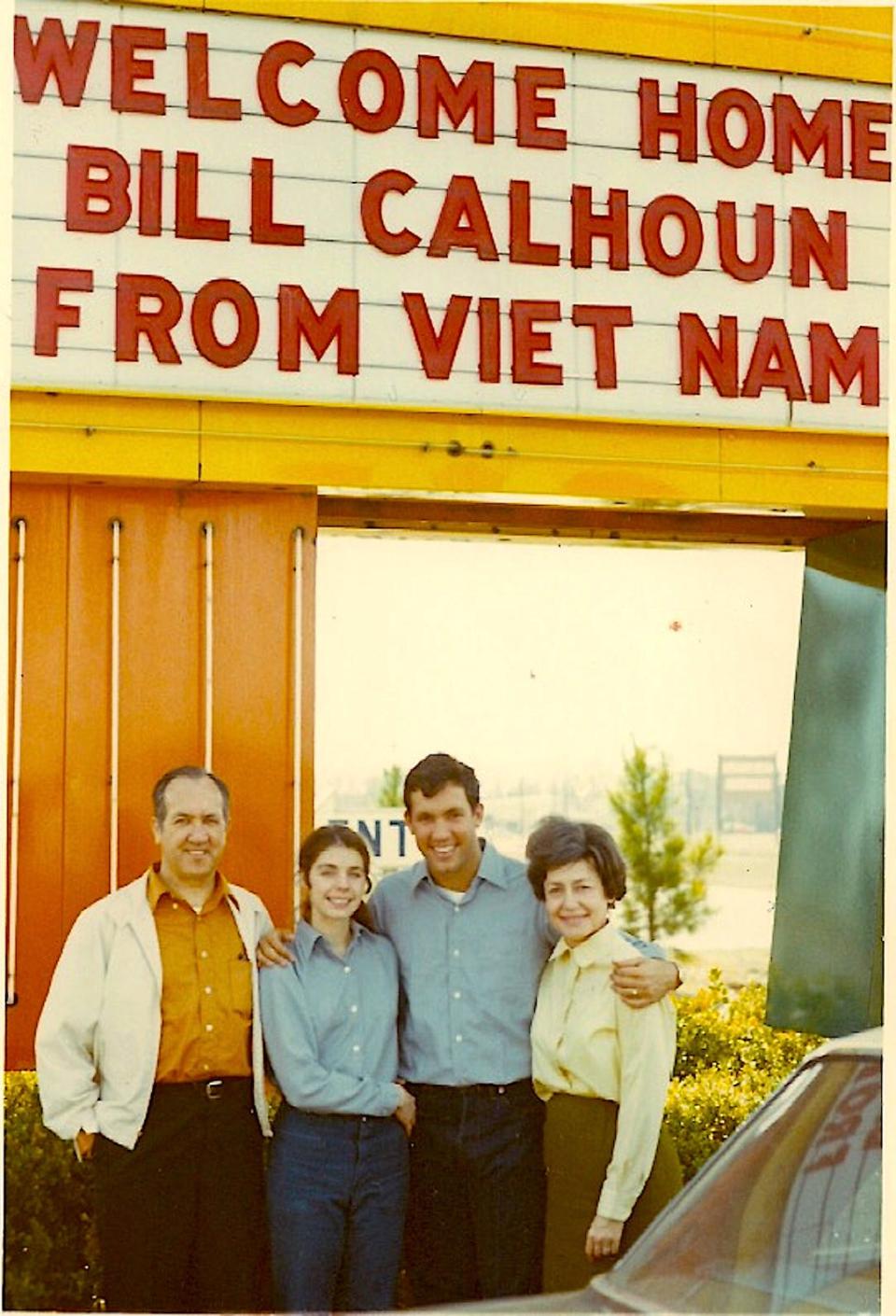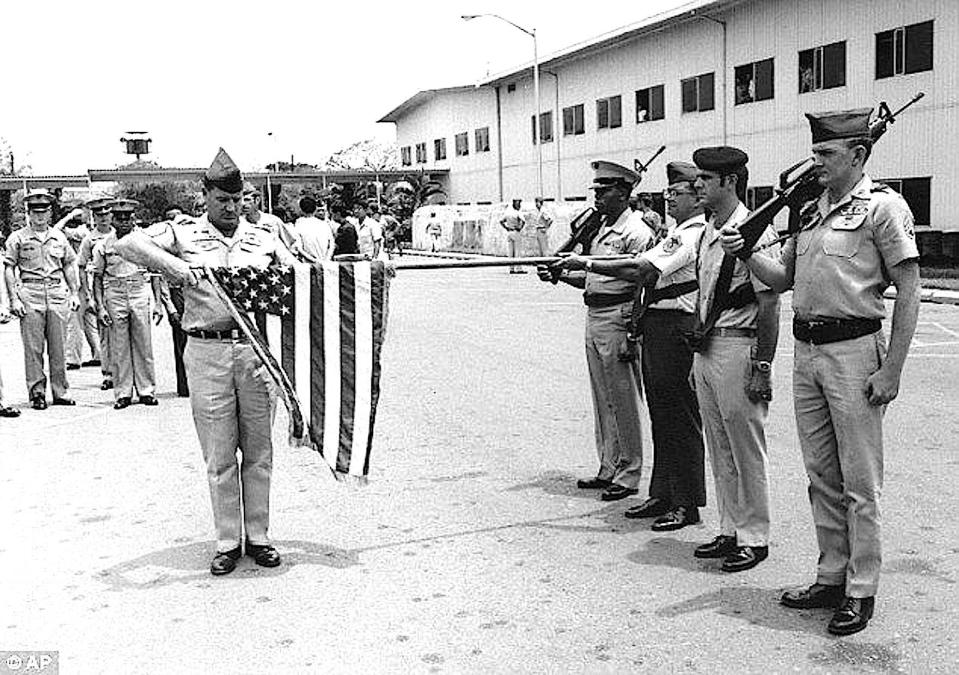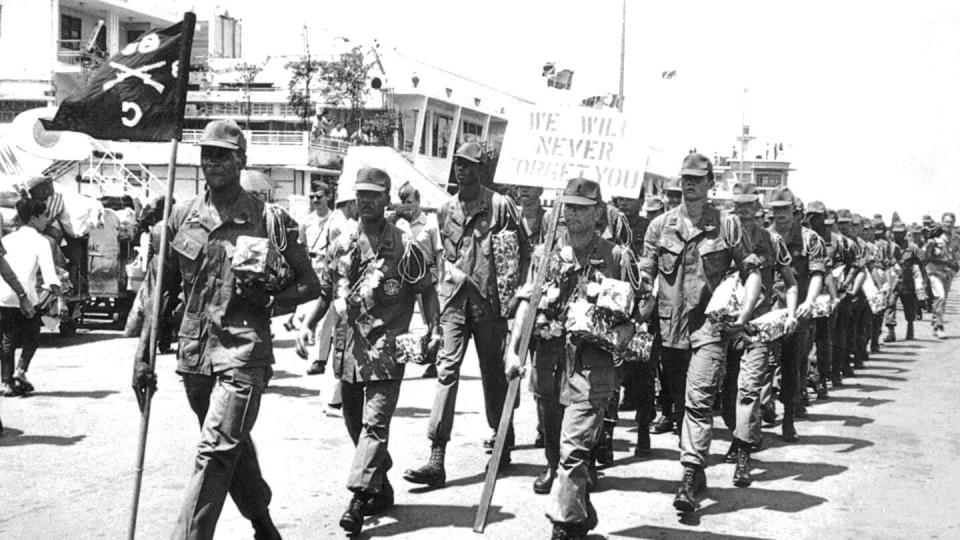Vietnam Veterans Day offers chance to say 'welcome home' — and clear up misconceptions
Wednesday, March 29, has been designated National Vietnam War Veterans Day. It was created in 2017 "to give Americans the opportunity to say 'Welcome Home' to a group of veterans who never got the reception they deserved when they returned to the United States.” Here’s the background.
The Bottom Line is a bar and grill in Warwick, adjacent to Rocky Point Park. It looks kind of sketchy from the outside, but it’s clean and cozy inside — a perfect place for old-timers from the neighborhood to meet up for a cold one and swap war stories.
You would never know it existed unless you lived in the area or tripped across it. Vince Grimley is one of the locals who claims it as his favorite watering hole. It’s the quintessential "dive bar,” laughs his wife, Toni Ann.
It’s also where a Vietnam combat veteran told Grimley a story that has bothered him to this day. But first, let’s rewind.
The dark side of America’s welcome home:Vietnam vets recount harassment and disrespect
Homecoming from Korea, 1951
Vince served in the Marines from 1948 to 1952 and fought in Korea with the 1st Provisional Marine Brigade. After reading the Veterans Voice column about the homecoming Vietnam veterans received, the 93-year-old Grimley wrote us a letter.
“By contrast, I will always remember my return from Korea [in 1951]. We received keys to the city of San Diego, free laundry, free dinner, free movies and more.”
One day at the Bottom Line, he asked a Vietnam veteran what he received upon his return. “He replied ‘eggs,’“ said Grimley indignantly. “He was pelted with rotten eggs.”
To be fair, this is not an apples-to-apples comparison
When the Greatest Generation went to war, they knew they were serving for the duration. They also came home as full units, thousands of men at a time. Full units also went into Korea and left the same way.
Most service members went to Vietnam as individual replacements for guys coming home. It was an eight-year revolving door.
Army soldiers knew their time “in country” was 365 days. From the day you arrived, you knew the day you were scheduled to go home. When your tour had fewer than 100 days left, you became a “short-timer.” Soldiers often greeted each other with, “How long?” The reply could be “37 days and a wake-up” with the wake-up referring to your last morning in Vietnam.
Women warriors, women’s voices: Recalling their time as nurses in Vietnam
(Many professional leaders hated this system, because there was a daily turnover of seasoned, experienced troops in favor of green replacements who did not know the ropes. This rotation system applied to all ranks, so one could argue that by the time you learned how to survive and function effectively you were gone.)
On the day of your “wake-up” you boarded your “freedom bird” — the aircraft that flew you away from Vietnam. But once you landed on the West Coast you were on your own, alone on the flight to your final destination.

And when you got home, what did you find?
A country torn apart by debate about the war. An economy free-falling into recession. The 1973 oil embargo.
The Vietnam-era GI Bill was an empty wagon compared with the full-ride education benefits your fathers received.
Perhaps worst of all, the VA system was totally unprepared to provide the help you needed.
Here's what they're building:Lockheed Martin invests in Rhode Island seaglider startup.
Efforts to make amends
On Jan. 27, 1973, the Paris Peace Accord formally ended direct U.S. involvement in the Vietnam War. We had 60 days to evacuate our remaining soldiers and Marines. On March 29, 1973, 23,000 remaining service members furled unit flags, packed belongings and left.

To much of the world, it was a non-event.
The Providence Journal of March 29, 1973, printed a relatively small two-column wire service story, with no photos.
So why is March 29 designated National Vietnam War Veterans Day?
There is no good reason, really. We know exactly when all our other wars started and when they ended. That’s not the case in Vietnam. There is also no great battle or achievement worth commemorating.
So what we have left is the anticlimax: the day we pulled out.
Having said that, kudos to those who worked long and hard to organize this day of tribute. It is a step in the right direction.

'You should have kept your mouth shut': Inside an alleged health care fraud brought down by FBI
Common myths that persist to this day
Last month I mentioned the social abyss that opened between veterans and the anti-war protesters — a gulf that still persists today for many. With the benefit of hindsight, it is clear that misinformation helped create (and maintain) this division.
Jim Webb commanded a Marine rifle platoon in Vietnam and 20 years later served as President Ronald Reagan’s Navy secretary. He said, “The biggest myth holds that the ordinary Vietnam combat veteran was so scarred by the experience that he couldn’t get his life together back home. Think of Travis Bickle, the lonesome, deranged vet of Martin Scorsese’s 1976 film ‘Taxi Driver.’”
It’s been 50 years, and many people still think Vietnam veterans are somewhat damaged as a group. They allegedly have a higher unemployment rate, a higher incarceration rate, and a higher rate of drug use than the rest of the population.
None of those assertions are true.
The VA has confirmed there is no difference in drug usage between Vietnam veterans and non-Vietnam veterans of the same age group.
Vietnam veterans were also less likely to be imprisoned — only one-half of 1 percent have been jailed for crimes.
Many believe most Vietnam veterans were drafted. In fact, two-thirds were volunteers. By contrast, two-thirds of those who served in World War II were drafted. Approximately 70% of those killed in Vietnam were volunteers.
For decades the media have reported that suicides among Vietnam veterans ranged from 50,000 to 100,000. Mortality studies show that 9,000 is a better estimate. The CDC Vietnam Experience Study Mortality Assessment did show a spike in the immediate aftermath of their trauma, but after five years had passed, Vietnam veterans were no more likely to die from suicide than non-Vietnam veterans.
Another common trope is that the number of those killed in action reflected a disproportionate number of Black troops.
Fact: 86% of the men who died in Vietnam were Caucasian, 12.5% were Black, 1.2% were other races. That is proportional to the number of Black people in the population at the time and slightly lower than the proportion of Black people in the Army in 1973.
Healing process is slow for many, but progress continues
In an upcoming column I will describe how (and to a certain extent why) our system failed Vietnam veterans. But there is light at the end of the tunnel, as the jagged edges are worn smooth by the passage of time, and the most vocal antagonists mellow.
Liz Cimini of Warwick wrote about her husband, Joe, who died in 2017. He served with the 14th Combat Engineer Battalion. “Many years later, he was almost brought to tears at [a store] in Garden City. A clerk about our age thanked him for his service when she noticed his Vietnam veterans cap. She explained to a much younger clerk about the need to honor those who'd served in such a hated war.”
Calendar
Commemoration of National Vietnam Veterans Day: Wednesday, March 29, 10:30-11:30 a.m.; RI State House, House Lounge.
Vietnam veterans, family and friends are encouraged to attend Wednesday's event. Refreshments will be served immediately afterward. Wayne Smith, who served a tour and an extension as a combat medic in Vietnam, will be the guest speaker. Please arrive early so you can clear security and be in the lounge by 10:30. Due to parking limitations, carpooling is recommended.
This is the 50th anniversary of the departure of our last combat troops from Vietnam. It is also the state's first ceremony for Vietnam Veterans Day since 2019 due to COVID. Brian Carn of the R.I. Council of Vietnam Veterans of America urges your participation. “A sparse turnout only sends the message that no one cares,” writes Carn. “Please don't let this happen. Come support Vietnam Veterans Day on Wednesday!”
Wednesday, March 29, 11 a.m.: Vietnam Veterans Day ceremony, Veterans Memorial, Deerfield Park, Smithfield. Sponsored by Balfour-Cole Post 64 American Legion. The public is invited, especially those who served in Vietnam. Contact Skip Sweeney, (401) 232-2621.
Wednesday, March 29, 1 to 4 p.m.: Texas Roadhouse offers Free “Welcome Home” Lunch for Vietnam Veterans on Vietnam Veterans Day. Providence Vet Center’s mobile van will be there to offer veteran services. There are only 50 spots available, and it is first come, first served. Make reservations with Missy Beaudoin at (860) 465-6364 or email 278marketing@texasroadhouse.com
Friday, March 31, 6:30 p.m.: RI National Guard hockey game, URI’s Boss Ice Arena, 1 Keaney Road, Kingston. The Air National Guard team will skate against the Army National Guard for the Adjutant General’s Cup. Admission is free, as are the T-shirts they will be giving away.
To report the outcome of a previous activity, or to add a future event to our calendar, please email the details (including a contact name and phone number/email address) to veteranscolumn@providencejournal.com.
This article originally appeared on The Providence Journal: National Vietnam War Veterans Day is March 29 — a chance to say thanks

